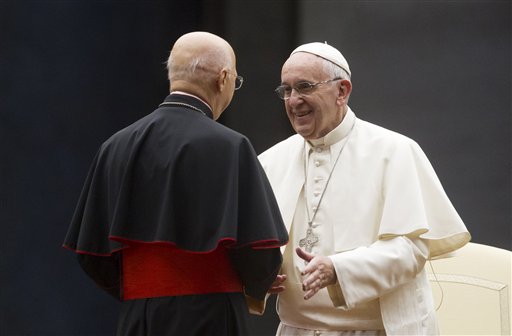Pope opens family meeting and sparks are expected to fly

Pope Francis greets Italian Episcopal conference (CEI) president Cardinal Angelo Bagnasco, left, during a vigil ahead of the opening of the Synod of bishops, in St. Peter’s Square at the Vatican, Saturday, Oct. 3, 2015. (AP Photo/Riccardo De Luca)
VATICAN CITY— Few Vatican meetings have enjoyed as controversial a run-up as the three-week gathering of bishops on family issues that opens Sunday: There have been allegations of manipulation and coercion. Secret caucuses to plot strategy. A de-facto law passed to take the wind out of the debate. And on the eve of the synod, a Vatican monsignor outing himself, urging the pope to hear his voice, and denouncing widespread homophobia in the church.
Francis opens the contentious meeting of 270 of the world’s bishops with a Mass on Sunday morning, buoyed by his recent star turn in the United States, but dogged by deepening divisions between conservatives and progressives precisely over the issues he has asked them to discuss: ministering to today’s Catholic families in all their shapes and colors, including gays, those who divorce and other Catholics in “irregular” family situations.
The split came strongly to the fore last year during the first-round of the bishops’ meeting, and both sides have only dug in over the ensuing 12 months. As a result, sparks are expected to fly when the men, and a smattering of non-voting women, get down to work Monday.
“We are happy if there is turbulence,” said Cardinal Lorenzo Baldisseri, the Italian running the synod. “We are in the sea, and so there has to be some turbulence.”
Francis launched the synod process two years ago by sending out a 39-point questionnaire to bishops, parishes and ordinary Catholic families around the world asking about their understanding of and adherence to church teaching on family matters. Their responses showed a widespread rift between official Catholic teaching and practice, particularly on sex, marriage and homosexuality.
Article continues after this advertisementThe first meeting of bishops ended last October with no consensus on how to better welcome gays and divorced and civilly remarried Catholics in the church. Conservatives insisted that Catholic doctrine is clear and unchanging. Progressives acknowledged the doctrine but sought wiggle room in pastoral practice.
Article continues after this advertisementCardinal George Pell, the Vatican’s finance manager who is firmly in the conservative camp, predicted little more than a reaffirmation of the status quo would emerge in Round 2, albeit with perhaps better explanation as to why the status quo exists.
“It’s quite impossible for there to be any change in the church’s teaching on Communion for the divorced and remarried,” Pell said on the sidelines of a conference last week about helping gays overcome their homosexual tendencies.
The conference was one of many initiatives launched by conservative bishops in the run-up to the synod aimed at reasserting traditional Catholic teaching on marriage and homosexuality, which holds that gays are to be respected but that homosexual acts are “intrinsically disordered.”
In a clear challenge to that teaching, a mid-level official in the Vatican’s orthodoxy office, Monsignor Krzysztof Charamsa, announced Saturday that that he was a proud gay priest (with a boyfriend), called for the synod to take up the plight of gays, and denounced homophobia throughout the church.
The Vatican summarily fired him.
Gay rights activists, who were in Rome to try to influence the synod from the sidelines, came to his defense and urged the synod fathers to assert that there is no place for homophobia in the church.
Former Irish President Mary McAleese, a practicing Catholic with a gay son, said she hoped that more transparency would help “kill for once and all this terrible lie” that everyone was born heterosexual.
But there is little sense the synod will show any new great opening to gays after the first round pulled back on a ground-breaking welcome initiated mid-way through. In that mid-way report, the bishops said gay unions could provide “precious” support for partners.
In a new book “The Rigging of a Vatican Synod?” author Edward Pentin asserts that the mid-way report was essentially manipulated by the Vatican’s synod organizers, using heavy-handed, coercive tactics that didn’t reflect the synod membership.
More movement may emerge on the other hot-button issue, whether divorced and civilly-remarried Catholics can receive Communion.
Catholics who divorce and want to remarry in the church must first obtain an annulment, a ruling from a church tribunal that their first marriage was invalid. Without the annulment, these civilly remarried Catholics are considered to be living in sin and cannot receive Communion, a condition that has lead generations of Catholics to feel shunned by their church.
Francis has sought a more merciful approach, insisting that these remarried Catholics be fully part of the life of the church. Progressive prelates led by German Cardinal Walter Kasper have called for a process by which a bishop could accompany these remarried Catholics on a path of penance that, over time and on a case-by-case basis, could lead to them receiving the sacraments.
Earlier this year, a handful of progressive German, Swiss and French bishops met in secret at Rome’s Pontifical Gregorian University to plot strategy ahead of the synod, allowing in only a handful of friendly progressive media in behind closed doors.
In the meantime, Francis pulled the rug out from under the debate to some degree by radically reforming the annulment process to make the decrees easier to obtain. Canon lawyers and conservatives have balked at the new law, asserting that it amounts to “Catholic divorce” — a charge Francis has vigorously denied.
Like it or not, however, the new law will make it easier for Catholics to get annulments, which may lessen the urgency of coming up with a definitive solution for the divorce/remarried issue at the synod.